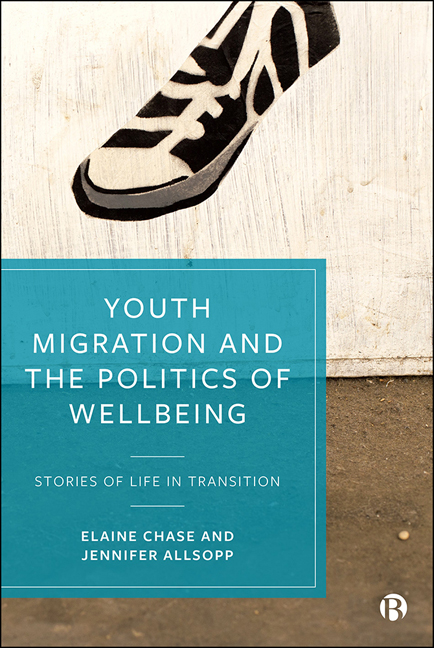Book contents
- Frontmatter
- Contents
- List of Figures
- Acknowledgements
- Foreword
- ‘Future’
- 1 Introduction
- 2 Conceptualizing Wellbeing in the Context of Migration and Youth Transitions
- 3 Capturing Wellbeing in Transition: An Alternative Approach
- 4 ‘Iron Rod’ or ‘Colander’? Welfare Regimes in England and Italy
- 5 The Pursuit of Safety and Freedom
- 6 Legal Integrity and Recognition
- 7 Identity and Belonging
- 8 Constructing Viable Futures as ‘Adults’
- 9 Emotional and Mental Wellbeing
- 10 Friendships, Connections and Relationships
- 11 Transnational Family and Connections
- 12 Conclusion
- Endnotes
- References
- Index
Foreword
Published online by Cambridge University Press: 21 April 2021
- Frontmatter
- Contents
- List of Figures
- Acknowledgements
- Foreword
- ‘Future’
- 1 Introduction
- 2 Conceptualizing Wellbeing in the Context of Migration and Youth Transitions
- 3 Capturing Wellbeing in Transition: An Alternative Approach
- 4 ‘Iron Rod’ or ‘Colander’? Welfare Regimes in England and Italy
- 5 The Pursuit of Safety and Freedom
- 6 Legal Integrity and Recognition
- 7 Identity and Belonging
- 8 Constructing Viable Futures as ‘Adults’
- 9 Emotional and Mental Wellbeing
- 10 Friendships, Connections and Relationships
- 11 Transnational Family and Connections
- 12 Conclusion
- Endnotes
- References
- Index
Summary
After decades of neglect by policy makers and scholars in both the migration and child welfare domains, child and youth migration is now receiving sustained attention as a critical aspect of contemporary migration. The scale of the phenomenon, the tragic humanitarian disasters it has generated, the legal, economic and social complexities it gives rise to have all contributed to the development of a robust, interdisciplinary engagement with issues of the movement of children and youth. Thus, over the past decade, state and civil society actors alike have devoted special resources to the needs of unaccompanied child migrants, whether as asylum seekers stranded on the Greek island of Lesvos or detainees held by the US immigration authorities. Legal representatives have advanced claims for refugee protection based on newly developed doctrines of childspecific persecution, while inspiring educators and health providers have crafted interventions specially targeted at the needs of the child migrant or refugee populations within their care. International organizations too have been responsive to the advocacy pressure to attend more explicitly to the distinctive needs of child migrants: UNHCR and the Committee on the Rights of the Child have crafted special guidance regarding the treatment of migrant and refugee children, the International Organization for Migration has developed programs geared to safely repatriating and reintegrating child migrants prevented from reaching their hoped-for migration destinations, and the two 2018 migration-related UN Global Compacts, on Refugees and Migration respectively, both include specific references to the rights and needs of child migrants and refugees.
Despite this welcome expansion of the migration and child welfare fields, much remains undone. In many rich societies that formally celebrate their commitment to ‘diversity’ and ‘multi-culturalism’, child and youth migrants continue to lack adequate access to legal, safe and regular migration opportunities – either because they remain subsumed within a broader (if outdated) conception of ‘family migration’ or because the class, race and wealth disparities that enable some but hinder most youth migration continue to be neglected. As a result, a disproportionate share of child and youth migration is irregular, with all the legal, social, economic and health consequences that flow from the absence of a legal status.
- Type
- Chapter
- Information
- Youth Migration and the Politics of WellbeingStories of Life in Transition, pp. vii - ixPublisher: Bristol University PressPrint publication year: 2020



